Sharilyn Grayson's Blog, page 3
March 11, 2013
Blueprint
When I decided, "Yes, I'm going to finish. I'm going to write this book straight through to the ending," I had a challenge ahead of me. I had all of those pages of fun dreaming and imagination without a clear end in sight. I had thought of an ending, but I didn't know how I was going to get there.

So I took a hard look at those pages, and I found the structure underneath. Though I was working backwards, not in an ideal way at all, I put the structure I had on paper. I saw the foundation and frames of the story so far. And then I created more frames to finish the structure I had begun. I noted areas of shaky construction (especially in the first chapter!), and planned to rebuild them.

I still brought that sense of joy and play to my work that I had discovered when I was just creating for pleasure. But I could see what I was doing. And believe it or not, the presence of that plan removed a lot of stress from me! I never felt again that sense of panic I had when I saw my book as overgrown. Because I had a blueprint, I could think more about details than direction. I could put energy into the finish work, not the structure.

What I built this time is a different shape and style than I imagined at first. When I used to dream about publishing a book, I assumed I would write something serious for adults, something that would pay tribute to Jane Austen or C.S. Lewis. Instead, I wrote a book for kids that pays tribute to Gene Roddenberry and J.M. Barrie. Who would have thought?
Read Dawn Hyperdrive and the Galactic Handbag of Death! You can try the first chapter for free at my website and then buy a copy at Amazon or at Smashwords.

So I took a hard look at those pages, and I found the structure underneath. Though I was working backwards, not in an ideal way at all, I put the structure I had on paper. I saw the foundation and frames of the story so far. And then I created more frames to finish the structure I had begun. I noted areas of shaky construction (especially in the first chapter!), and planned to rebuild them.

I still brought that sense of joy and play to my work that I had discovered when I was just creating for pleasure. But I could see what I was doing. And believe it or not, the presence of that plan removed a lot of stress from me! I never felt again that sense of panic I had when I saw my book as overgrown. Because I had a blueprint, I could think more about details than direction. I could put energy into the finish work, not the structure.

What I built this time is a different shape and style than I imagined at first. When I used to dream about publishing a book, I assumed I would write something serious for adults, something that would pay tribute to Jane Austen or C.S. Lewis. Instead, I wrote a book for kids that pays tribute to Gene Roddenberry and J.M. Barrie. Who would have thought?
Read Dawn Hyperdrive and the Galactic Handbag of Death! You can try the first chapter for free at my website and then buy a copy at Amazon or at Smashwords.
Published on March 11, 2013 07:17
March 8, 2013
Mine
The whole time I was learning these valuable lessons from ghostwriting, my own stories were fading into cyber-dust in my digital literary graveyard. Occasionally, like the ghost of Hamlet's father, a character from an archived story would interrupt my train of thought when I was walking in my neighborhood or half-asleep at night or doing some mundane chore and remind me of its existence and my obligations to it. It would tell me how things were going in its particular purgatory and attempt to draw my interest again. But I habitually made my excuses to each one in turn and kept doing whatever had occupied me until it faded away again. After all, I was busy working.

And the work I was doing was good work. You can see from the last few posts that it was engaging me creatively and teaching me to be a better writer. This is the kind of job you're supposed to want, right? You're supposed to get a job doing what you love, and then you'll never work a day in your life. Have you heard that little truism? Like all truisms, it's about half true.

What no one told me about ghostwriting before I started doing it is how painful it is. Here I had blended my talent and time and imagination and bits of my soul into these people who lived in these pages, and I loved them. They were people I had made, people I wanted to protect. But they didn't belong to me. I had to give them away to be changed and renamed. No matter how much the new author loved them, I felt a deep sense of loss in the surrender.

And like nearly all wives since Eve, I told my husband how sad I was. But my husband, who is not one of those fictional, manageable beings who offer Kleenex and cocktails when confronted with connubial tears, asked me when I was going to write something of my own. "Look how many books you've already started. Why don't you just finish one? What about Dawn Hyperdrive - how long would it take to finish that one?" And though I tossed him all of the excuses I'd given everyone else for years on why I've never written a book (when you have as many children as I do, people feel nothing but sympathy for you and amazement that you're relatively sane), he didn't believe them.
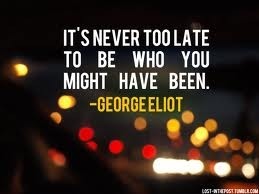
Probably most of the reason he didn't believe them is that I secretly didn't believe them, either. I knew that the last few ghostwriting jobs I had finished had changed me inside. I had discovered the radioactive spider bite, the bat-identity, the star ship with my name on the duty roster that would take me to new galaxies of possibility. I knew what worked for me. And I wanted to work - for me.
Read the book that changed my life! Dawn Hyperdrive and the Galactic Handbag of Death is available at Amazon for Kindle and Kindle apps and at Smashwords for all other e-readers. You can try the first chapter for free at my website.

And the work I was doing was good work. You can see from the last few posts that it was engaging me creatively and teaching me to be a better writer. This is the kind of job you're supposed to want, right? You're supposed to get a job doing what you love, and then you'll never work a day in your life. Have you heard that little truism? Like all truisms, it's about half true.

What no one told me about ghostwriting before I started doing it is how painful it is. Here I had blended my talent and time and imagination and bits of my soul into these people who lived in these pages, and I loved them. They were people I had made, people I wanted to protect. But they didn't belong to me. I had to give them away to be changed and renamed. No matter how much the new author loved them, I felt a deep sense of loss in the surrender.

And like nearly all wives since Eve, I told my husband how sad I was. But my husband, who is not one of those fictional, manageable beings who offer Kleenex and cocktails when confronted with connubial tears, asked me when I was going to write something of my own. "Look how many books you've already started. Why don't you just finish one? What about Dawn Hyperdrive - how long would it take to finish that one?" And though I tossed him all of the excuses I'd given everyone else for years on why I've never written a book (when you have as many children as I do, people feel nothing but sympathy for you and amazement that you're relatively sane), he didn't believe them.

Probably most of the reason he didn't believe them is that I secretly didn't believe them, either. I knew that the last few ghostwriting jobs I had finished had changed me inside. I had discovered the radioactive spider bite, the bat-identity, the star ship with my name on the duty roster that would take me to new galaxies of possibility. I knew what worked for me. And I wanted to work - for me.
Read the book that changed my life! Dawn Hyperdrive and the Galactic Handbag of Death is available at Amazon for Kindle and Kindle apps and at Smashwords for all other e-readers. You can try the first chapter for free at my website.
Published on March 08, 2013 08:29
March 7, 2013
Wiggle Room
Once, I wrote a book for a client that turned my expectations upside down. The client handed me the plot, the characters, and the point he wanted to make. We rearranged the plot and wrote a new outline that we both agreed would work better, but as far as I was concerned, everything that mattered had come from him. I was just managing what he had created, not creating anything myself.
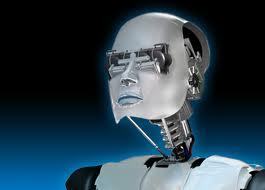
But when I sat down to write, his characters sometimes refused to do what we had agreed. They didn't want to say what we had scripted or go where we had sent them. Sometimes they pointed to huge sinkholes in the plot that would swallow them whole if I forced them to march ahead. The more I understood them and got to know them, the more willing I was to bend the plan to follow them. I was willing to listen to them and let them forge the path.
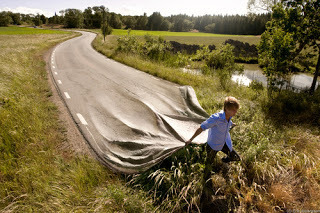
I still knew where we were going, and I reminded them of the big picture. But in the individual scenes, in the small moments and personal conversations, I let them be. I sat back and watched. And I was profoundly grateful for the gift of imagination and for the diversity of human beings. Imagination has to have some fodder, right?

That client's book taught me not to stay wholly within the confines of the structure and progression I needed in order to write at all. It taught me to listen, to observe, and to exercise the humility necessary to admit that I did not foresee every twist and turn before the story started. C. S. Lewis has said that "we read to know we are not alone." Soulless robots prompt no warm pull of recognition, no glow of comfort.
I put that lesson to good use in Dawn Hyperdrive and the Galactic Handbag of Death! Try the first chapter for free at my website, and then buy the book at Amazon for Kindle and Kindle apps or at Smashwords for all other e-readers.

But when I sat down to write, his characters sometimes refused to do what we had agreed. They didn't want to say what we had scripted or go where we had sent them. Sometimes they pointed to huge sinkholes in the plot that would swallow them whole if I forced them to march ahead. The more I understood them and got to know them, the more willing I was to bend the plan to follow them. I was willing to listen to them and let them forge the path.

I still knew where we were going, and I reminded them of the big picture. But in the individual scenes, in the small moments and personal conversations, I let them be. I sat back and watched. And I was profoundly grateful for the gift of imagination and for the diversity of human beings. Imagination has to have some fodder, right?

That client's book taught me not to stay wholly within the confines of the structure and progression I needed in order to write at all. It taught me to listen, to observe, and to exercise the humility necessary to admit that I did not foresee every twist and turn before the story started. C. S. Lewis has said that "we read to know we are not alone." Soulless robots prompt no warm pull of recognition, no glow of comfort.
I put that lesson to good use in Dawn Hyperdrive and the Galactic Handbag of Death! Try the first chapter for free at my website, and then buy the book at Amazon for Kindle and Kindle apps or at Smashwords for all other e-readers.
Published on March 07, 2013 07:21
March 6, 2013
Structure
Ghostwriting was valuable work for me. Not only did it pay the bills, but it also taught me a lot about how I write and how I think. One story in particular just captured my heart. I couldn't stop thinking about the characters, who felt like family to me. So I constructed a meticulous, 68-point outline for their book. I thought I had the structure and order down.
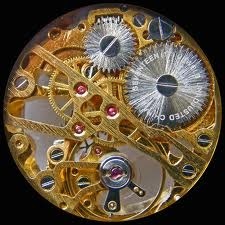
And because every piece integrated so well with every other piece, I thought I could just write whatever interested me that day. On days when I was happy and the sun was shining and my kids weren't yelling at each other, I wrote the love story. On days when I wanted to cry anyway, I wrote the hard parts. I thought that it was working just fine. But it wasn't.

I had forgotten that, as time passes, people change. I'm not the same person with the same reactions and thoughts and views on life at thirty-eight as I was at sixteen or twenty-seven. The time that passes changes me. The same thing happens with characters. As you live through events with them, they change, and your perspective of them changes. So though the structure worked for me, it didn't work as well as it would have if I'd written it in order.
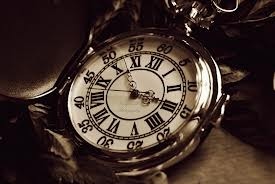
I applied that lesson to later books. I'll tell you about another one next time.
The one you can read right now is Dawn Hyperdrive and the Galactic Handbag of Death. Try the first chapter for free at my website, and then buy it for Kindle or Kindle apps at Amazon or for all other e-readers at Smashwords!

And because every piece integrated so well with every other piece, I thought I could just write whatever interested me that day. On days when I was happy and the sun was shining and my kids weren't yelling at each other, I wrote the love story. On days when I wanted to cry anyway, I wrote the hard parts. I thought that it was working just fine. But it wasn't.

I had forgotten that, as time passes, people change. I'm not the same person with the same reactions and thoughts and views on life at thirty-eight as I was at sixteen or twenty-seven. The time that passes changes me. The same thing happens with characters. As you live through events with them, they change, and your perspective of them changes. So though the structure worked for me, it didn't work as well as it would have if I'd written it in order.

I applied that lesson to later books. I'll tell you about another one next time.
The one you can read right now is Dawn Hyperdrive and the Galactic Handbag of Death. Try the first chapter for free at my website, and then buy it for Kindle or Kindle apps at Amazon or for all other e-readers at Smashwords!
Published on March 06, 2013 06:55
March 5, 2013
Overgrown
For the first part of Dawn Hyperdrive, the muses were with me. I had ideas. I was curious about the story. I was having fun. But one day I opened the file and didn't know what to write next. And I looked over the first half of what I had written and saw this:

It seemed rambling and disconnected, and it wore me out. What have I done? I panicked. Here I've been taking time away from work to play with this thing, and it's a mess! Once I calmed down, I closed the file and thought, I'll look at it later. Maybe it'll make sense to me later.

I have a file on my computer where all of my old stories go to die. Every once in a while, when I'd remember that I had a first name and a soul and was not just "Mom," I'd start a story. I'd get excited about it for a while. And then it would end up in my digital literary graveyard. I didn't want to admit it, but my toy car looked like it was broken - maybe forever. The overgrown, half finished ramble was probably going to stay overgrown and half finished.

Through a series of writing jobs over the next few months, I learned some things about myself and the way I write. I need structure and a plan. I need to write in order. And I need to be flexible enough to let things grow a little outside the lines.
Dawn Hyperdrive and the Galactic Handbag of Death is available here for Kindles and Kindle apps, and here for other e-readers like Nook and Kobo. You can try the first chapter for free at my website!

It seemed rambling and disconnected, and it wore me out. What have I done? I panicked. Here I've been taking time away from work to play with this thing, and it's a mess! Once I calmed down, I closed the file and thought, I'll look at it later. Maybe it'll make sense to me later.

I have a file on my computer where all of my old stories go to die. Every once in a while, when I'd remember that I had a first name and a soul and was not just "Mom," I'd start a story. I'd get excited about it for a while. And then it would end up in my digital literary graveyard. I didn't want to admit it, but my toy car looked like it was broken - maybe forever. The overgrown, half finished ramble was probably going to stay overgrown and half finished.

Through a series of writing jobs over the next few months, I learned some things about myself and the way I write. I need structure and a plan. I need to write in order. And I need to be flexible enough to let things grow a little outside the lines.
Dawn Hyperdrive and the Galactic Handbag of Death is available here for Kindles and Kindle apps, and here for other e-readers like Nook and Kobo. You can try the first chapter for free at my website!
Published on March 05, 2013 06:05
March 4, 2013
Names
When I started planning the book, I had a lot of fun coming up with the names. Most of them just came to me in a flash; a few, I dithered over for a while. One of the names that gave me some trouble was the name of the villain.
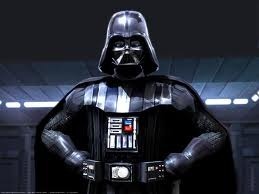
I mean, you hear the name "Darth Vader," and you automatically know he's trouble. You've got a hint of the word "dark" and a hint of the word "raider" and a whole lot of bad mojo you can't quite explain. Or look at this guy:
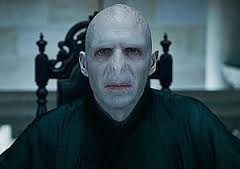
Other people have already covered what Voldemort's name means. Throwing the "mort" in there, it's definitely something to do with death. His name is pretty scary, even before you ever meet him in the book. But my baseline was this guy:
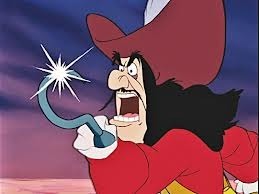
Captain James Hook - he starts with the respectable and genteel "Captain" and adds a little humanity, maybe even some borrowed regality, with the first name "James." But what is menacing about him is the "Hook." That last name came to him after the crocodile ate his hand - it's a Neverland name. Who was he before? Was there a before? Barrie doesn't tell us. All we know is that he's named for a weapon - and a flaw. So I wanted my villain to have some kind of danger, like a weapon, in her name. And unlike the guys named above, my villain was going to be female. I needed something feminine.

Enter Regina, from Once Upon a Time (my older girls and I love that show!) She really sells that old Disney glamorous evil queen persona. I thought of her and how wicked she is at the same time that she's really gorgeous, and Mrs. Scales just came to me. But she also changed a lot of the planning I'd already done. I hadn't intended to reference fairy tales at all in my space book. But naming Mrs. Scales convinced me that they belonged. After all, I started asking who she was and how she got her name, and the answers I got were all fairy-tale answers.
Find out the answers I got in Dawn Hyperdrive and the Galactic Handbag of Death! You can try the first chapter for free here, and you can buy the ebook for Kindle and Kindle apps here, or for Nook and Kobo and other e-readers here.

I mean, you hear the name "Darth Vader," and you automatically know he's trouble. You've got a hint of the word "dark" and a hint of the word "raider" and a whole lot of bad mojo you can't quite explain. Or look at this guy:

Other people have already covered what Voldemort's name means. Throwing the "mort" in there, it's definitely something to do with death. His name is pretty scary, even before you ever meet him in the book. But my baseline was this guy:

Captain James Hook - he starts with the respectable and genteel "Captain" and adds a little humanity, maybe even some borrowed regality, with the first name "James." But what is menacing about him is the "Hook." That last name came to him after the crocodile ate his hand - it's a Neverland name. Who was he before? Was there a before? Barrie doesn't tell us. All we know is that he's named for a weapon - and a flaw. So I wanted my villain to have some kind of danger, like a weapon, in her name. And unlike the guys named above, my villain was going to be female. I needed something feminine.

Enter Regina, from Once Upon a Time (my older girls and I love that show!) She really sells that old Disney glamorous evil queen persona. I thought of her and how wicked she is at the same time that she's really gorgeous, and Mrs. Scales just came to me. But she also changed a lot of the planning I'd already done. I hadn't intended to reference fairy tales at all in my space book. But naming Mrs. Scales convinced me that they belonged. After all, I started asking who she was and how she got her name, and the answers I got were all fairy-tale answers.
Find out the answers I got in Dawn Hyperdrive and the Galactic Handbag of Death! You can try the first chapter for free here, and you can buy the ebook for Kindle and Kindle apps here, or for Nook and Kobo and other e-readers here.
Published on March 04, 2013 06:18
March 2, 2013
My Toy Car
So I had a great idea for a book. I wanted to write it. I set aside some time from my other work to jot down a few paragraphs. But I had one problem.

This is how I felt through most of a typical day, and especially at the end of it. I have six kids, and the requisite household chores and field trip forms and homework monitoring and tending of emotional wounds that comes with six kids, not to mention the marriage that made them. I also had a part-time job as an editor and ghostwriter. I also like doing things like singing in choir and reading for pleasure. I didn't feel like I had time to pour into a book of my own. It felt like this:

I felt that pouring time into writing for myself was like jumping off the side of a cliff. Give me a parachute or not - that's still scary. I felt like making the space in my head and my soul to nurture a book start to finish would knock me off the precarious balance I had struck into a spinning lack of control, where goodness knows what would happen next. That's when I read a post from Kate DiCamillo.
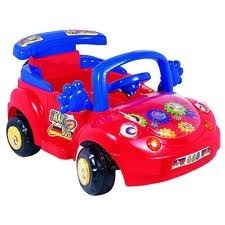
She was sharing some writing advice from a fellow author who talked about his toy car. In the mornings, this author would do the paying work, the book his publisher expected. But in the afternoons, he'd write for fun. He'd play with an idea that may go somewhere or not. But the point was that he played with his ideas.
I can do that, I thought. I can take just a little bit of time from ghostwriting to play. I won't finish this book. I'll just play with the idea.
My toy car is now Dawn Hyperdrive and the Galactic Handbag of Death, which is available on Amazon and at Smashwords. Give it a try at my website!

This is how I felt through most of a typical day, and especially at the end of it. I have six kids, and the requisite household chores and field trip forms and homework monitoring and tending of emotional wounds that comes with six kids, not to mention the marriage that made them. I also had a part-time job as an editor and ghostwriter. I also like doing things like singing in choir and reading for pleasure. I didn't feel like I had time to pour into a book of my own. It felt like this:

I felt that pouring time into writing for myself was like jumping off the side of a cliff. Give me a parachute or not - that's still scary. I felt like making the space in my head and my soul to nurture a book start to finish would knock me off the precarious balance I had struck into a spinning lack of control, where goodness knows what would happen next. That's when I read a post from Kate DiCamillo.

She was sharing some writing advice from a fellow author who talked about his toy car. In the mornings, this author would do the paying work, the book his publisher expected. But in the afternoons, he'd write for fun. He'd play with an idea that may go somewhere or not. But the point was that he played with his ideas.
I can do that, I thought. I can take just a little bit of time from ghostwriting to play. I won't finish this book. I'll just play with the idea.
My toy car is now Dawn Hyperdrive and the Galactic Handbag of Death, which is available on Amazon and at Smashwords. Give it a try at my website!
Published on March 02, 2013 09:18
March 1, 2013
Inspiration
One of the first things people ask me when they hear I've published a book is: "So where did you get the idea?" For Dawn Hyperdrive and the Galactic Handbag of Death, the idea found me and practically hit me over the head every day for a few weeks. Here it is:
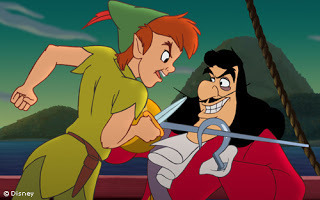
My youngest daughter was two when I began writing Dawn Hyperdrive, and like all toddlers, she goes through phases where she gets attached to one thing or another. One week last spring, it was the Disney Peter Pan. I didn't always watch it with her. Sometimes I left it on while I cooked dinner or edited someone else's manuscript or folded laundry. But a few times, I did actually cuddle with her on the sofa and watch the movie.
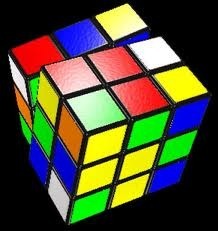
The idea hit me: What would the story look like if all the gender roles were reversed and it took place now? What if I just mixed it all up?
So I started with a one-to-one allegory, creating female counterparts to Hook and Pan and John and Michael and making my Wendy a thirteen-year-old boy. The family name is even the Dearmans, from the Darlings. But beyond that stage, the allegory broke down into something trite. Also, I started asking questions.
Peter Pan is all about youth and age and the nature of time and family and belonging. When you start asking questions about such big ideas, you get surprising answers. My answers surprised me into a story I never expected to tell.

If you're interested in my answers, go get a copy of Dawn Hyperdrive and the Galactic Handbag of Death at Amazon for Kindles or Kindle apps or at Smashwords for all other e-readers and computers!

My youngest daughter was two when I began writing Dawn Hyperdrive, and like all toddlers, she goes through phases where she gets attached to one thing or another. One week last spring, it was the Disney Peter Pan. I didn't always watch it with her. Sometimes I left it on while I cooked dinner or edited someone else's manuscript or folded laundry. But a few times, I did actually cuddle with her on the sofa and watch the movie.

The idea hit me: What would the story look like if all the gender roles were reversed and it took place now? What if I just mixed it all up?
So I started with a one-to-one allegory, creating female counterparts to Hook and Pan and John and Michael and making my Wendy a thirteen-year-old boy. The family name is even the Dearmans, from the Darlings. But beyond that stage, the allegory broke down into something trite. Also, I started asking questions.
Peter Pan is all about youth and age and the nature of time and family and belonging. When you start asking questions about such big ideas, you get surprising answers. My answers surprised me into a story I never expected to tell.

If you're interested in my answers, go get a copy of Dawn Hyperdrive and the Galactic Handbag of Death at Amazon for Kindles or Kindle apps or at Smashwords for all other e-readers and computers!
Published on March 01, 2013 06:15
February 28, 2013
DAWN HYPERDRIVE IS FINALLY OUT!
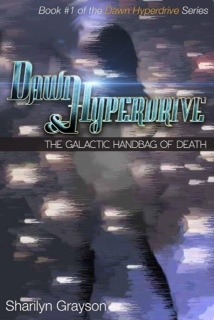
I want to thank the following people for helping me launch Dawn Hyperdrive & The Galactic Handbag of Death: Drew Macarthur, web designer and computer artist extraordinaire, for my website and book cover, Kristin Grimm and Jennie Schut for reading and commenting and being there, and Social Marmalade for media help.
You can purchase Dawn Hyperdrive & The Galactic Handbag of Death at Amazon (http://www.amazon.com/-/e/B00BJRI6S6) or at Smashwords (https://www.smashwords.com/books/view...).
Published on February 28, 2013 21:11



